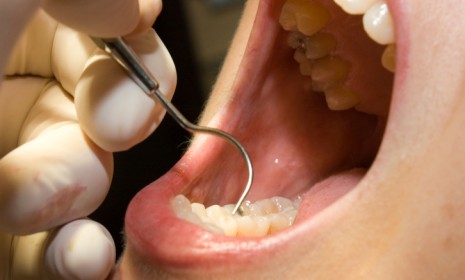The new discovery that cavity-proofs your teeth
Kiss the dental drill goodbye: A pair of scientists discovers a revolutionary molecule called Keep 32 that kills all the nasty germs responsible for tooth decay

A free daily email with the biggest news stories of the day – and the best features from TheWeek.com
You are now subscribed
Your newsletter sign-up was successful
If you'd sooner sit through another rendition of "Call Me Maybe" than visit the dentist office, take heart: Scientists have discovered a new molecule called Keep 32 that kills all the nasty cavity-causing germs in your mouth, thereby making your trips to the dreaded dental chair less frequent and less terrifying. Here, a brief guide to the breakthrough:
How does it work?
Keep 32 (which gets its name from the number of teeth you have) targets a mouth-dwelling bacteria called streptococcus mutans, which metabolizes any leftover sugar into the lactic acid "that slowly but surely" eats away at tooth enamel, says Sui Ying Teoh at Geekosystem. Within 60 seconds, Keep 32 kills all the gross teeth-eating bacteria in your mouth and prevents the pesky germs from coming back for hours at a time, effectively cavity-proofing your pearly whites.
The Week
Escape your echo chamber. Get the facts behind the news, plus analysis from multiple perspectives.

Sign up for The Week's Free Newsletters
From our morning news briefing to a weekly Good News Newsletter, get the best of The Week delivered directly to your inbox.
From our morning news briefing to a weekly Good News Newsletter, get the best of The Week delivered directly to your inbox.
How is it applied?
The special molecule can be added to just about any product, including toothpaste, mouthwash, gum, or even candy.
Who invented Keep 32?
The cavity-zapper is the brainchild of Jose Cordova from Yale University and Erich Astudillo of Chile's Universidad de Santiago. The pair began research in 2005 and are hoping to have the product market-ready within the next 14 to 18 months, pending FDA approval. The hope, says Jesus Diaz at Gizmodo, is that they'll be able to license their patent to dental companies like Colgate or Procter & Gamble, as well purveyors of sugary snacks like Hershey's or Cadbury.
A free daily email with the biggest news stories of the day – and the best features from TheWeek.com
Is there anything to worry about?
It's an antibiotic, says Evan Ackerman at Dvice, and "the thing about antibiotics is that unless they're 100 percent effective," bacteria will develop a natural resistance to them. In other words, the bacteria will get "meaner and meaner until the antibiotic doesn't do anything anymore." Still, says Geekosystem's Teoh, it's a "revolutionary discovery" that will hopefully minimize the time you spend every year cringing in a dentist's chair.
Sources: Dvice, Geekosystem, Gizmodo